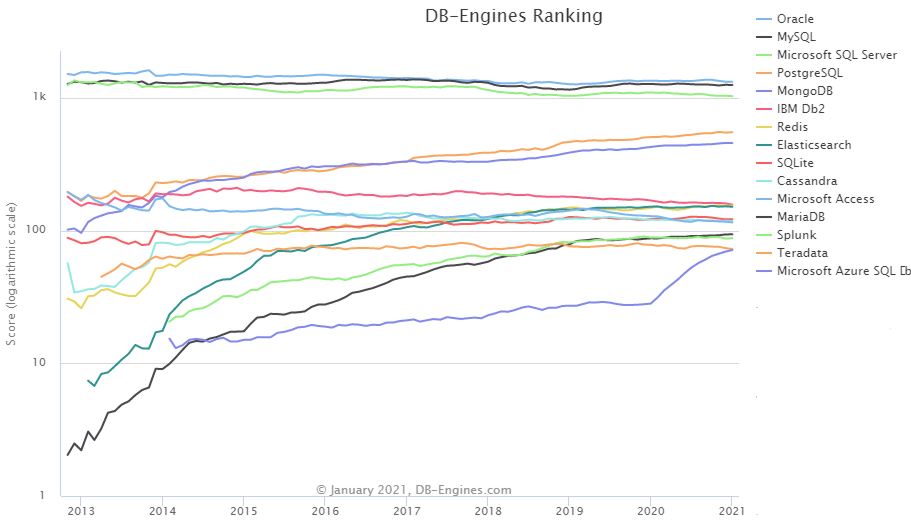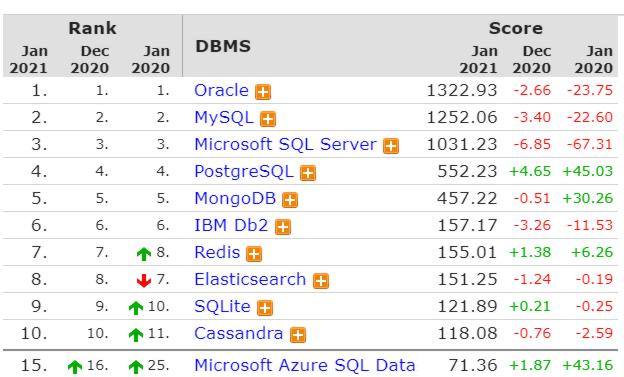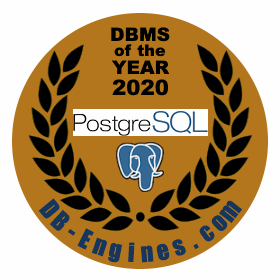| PostgreSQL Is DB-Engines DBMS of the Year For 2020 |
| Written by Nikos Vaggalis | |||
| Friday, 15 January 2021 | |||
|
In yet another confirmation of its popularity and worth, PostgreSQL has taken the annual accolade awarded by DB-Engines. In a short statement, DB-Engines states: PostgreSQL is the database management system that gained more popularity in our DB-Engines Ranking within the last year than any of the other 360 monitored systems. We thus declare PostgreSQL as the DBMS of the Year 2020. We not covered DB-Engines ranking before even though its been going since 2013 and its chart has an obvious similarity to the TIOBE Index in that it adds new datapoints each month: So what are the metrics,how is that ranking calculated? DB-Engines ranks products by their current popularity according to the following methodology :
The criterion for becoming DB-Engine of the Year is having the largest increase in popularity between successive Januarys: From this table the top three DBMSs, Oracle, MYSQL and SQL Server all declined in popularity in 2020 while PostgresSQL, in 4th place overall showed the greatest increase over over 45 points. Microsoft Azure, way down the league in 15th place was close in terms of points and given its much smaller overall score its shoowed a noticeably steep increase. MongoDB also showed strong performance in 2020. Not only was PostgreSQL the most popular DBMS of last year itbecame the first system to win this title three times, having already won the 2017 and 2018 awards.
But let's get behind the scenes,what is the reason of PostgreSQL's huge popularity? In three words, Stability, Features and Extensibility. I've given a high level overview in "The Enduring Influence Of Postgres", which is a historical recollection of the Postgres project and its impact on the DBMS industry which provides insight into the key features of the object-relational database as conceived by Mike Stonebraker;or in other words the innovative ideas that shaped Stonebraker's vision before anyone else. Supporting ADTs in a Database System Extensible access methods for new data types Active Databases and Rule Systems Log-centric Storage and Recovery Support for Multiprocessors: XPRS Support for a Variety of Language Models Open Source Commercial Adaptations Come to now we can enjoy the fruits of Stonebraker's vision.DBMS's have encompassed a number of technologies far beyond the relational model, although PostgreSQL has got the full package.For example:
The OSS aspect and community of the case.Postgres became open source therefore open to contributions once it escaped the confinements of the Berkley laboratory.It was this property that in the end let it evolve into a melting pot of the newest and greatest ideas; and this move paid dividends very soon.After two students introduced a variant of SQL to the engine in place of the propriety Postquel query language (QUEL was Ingres's) the team got distracted with other activities.At this point the open source contributors stepped in by not just contributing peripherally but also improving the very core.Since then the community has been growing. Being that versatile it acts as the base for other groundbraking products like Citus which extends Postgres to a horizontally scalable distributed database beyond a single node of 100GB.PostgreSQL has long been an attractive starting point for building commercial database systems, given its permissive open source license, its robust codebase, its flexibility, and breadth of functionality. And finally, Stability; there no backwards breaking compatibility. Each release just upgrades and makes things better. In conclusion, I'm not surprised at all that PostresSQL won the award and I predict it may well happen again another year. More InformationPostgreSQL is the DBMS of the Year 2020
Related ArticlesConnecting To The Outside World with Perl and Database Events
To be informed about new articles on I Programmer, sign up for our weekly newsletter, subscribe to the RSS feed and follow us on Twitter, Facebook or Linkedin.
Comments
or email your comment to: comments@i-programmer.info |
|||
| Last Updated ( Friday, 15 January 2021 ) |





